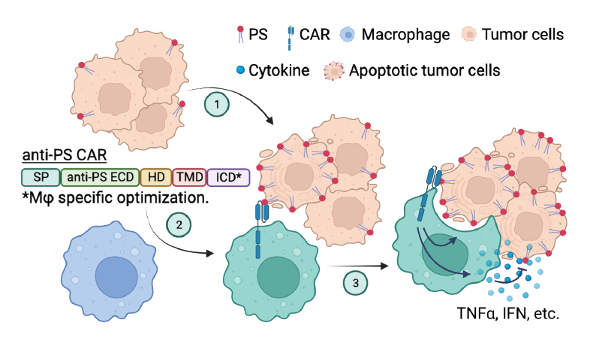

Invention Summary:
Chimeric Antigen Receptor (CAR) therapy requires isolation of the respective immune cells from the patient’s blood, genetic manipulation, and infusion of the modified cells back into the patient’s body. This makes it personalized and effective but expensive. The CAR-T (modified T cells) therapy has shown promise in hematological cancers, but are less so in solid tumors. CAR-macrophages have received interest recently for their “tumor-homing” and “immune-modulating” abilities which may improve their CAR cell efficacy in solid tumors. The combination of such macrophages and chemotherapy in advanced solid tumors may be a powerful therapeutic tool for patients running out of options.
Rutgers researchers have developed a novel CAR construct inserted into tumor infiltrating macrophages that specifically binds to the membrane antigens exposed on the surface certain solid tumor cells. This induces direct cancer cell death as well as a robust tumoricidal immune response recruiting a variety of white blood cells to the neoplasm . This proprietary CAR construct can be stably expressed in the established iPSC-derived macrophage cell lines using lentiviral vector systems. This allows for off-the-shelf allogenic CAR-macrophages capable of treating many patients.
Market Applications:
- Cell-based cancer immunotherapy
- Adjuvant cancer chemotherapy
Advantages:
- Universal cancer-specific antigen
- Off-the shelf allogenic CAR system
- Infiltrates multiple solid tumor types.
- Synergistic with other anti-cancer therapeutics
Intellectual Property & Development Status: Patent pending. Available for licensing and/or search collaboration. For any business development and other collaborative partnerships contact marketingbd@research.rutgers.edu